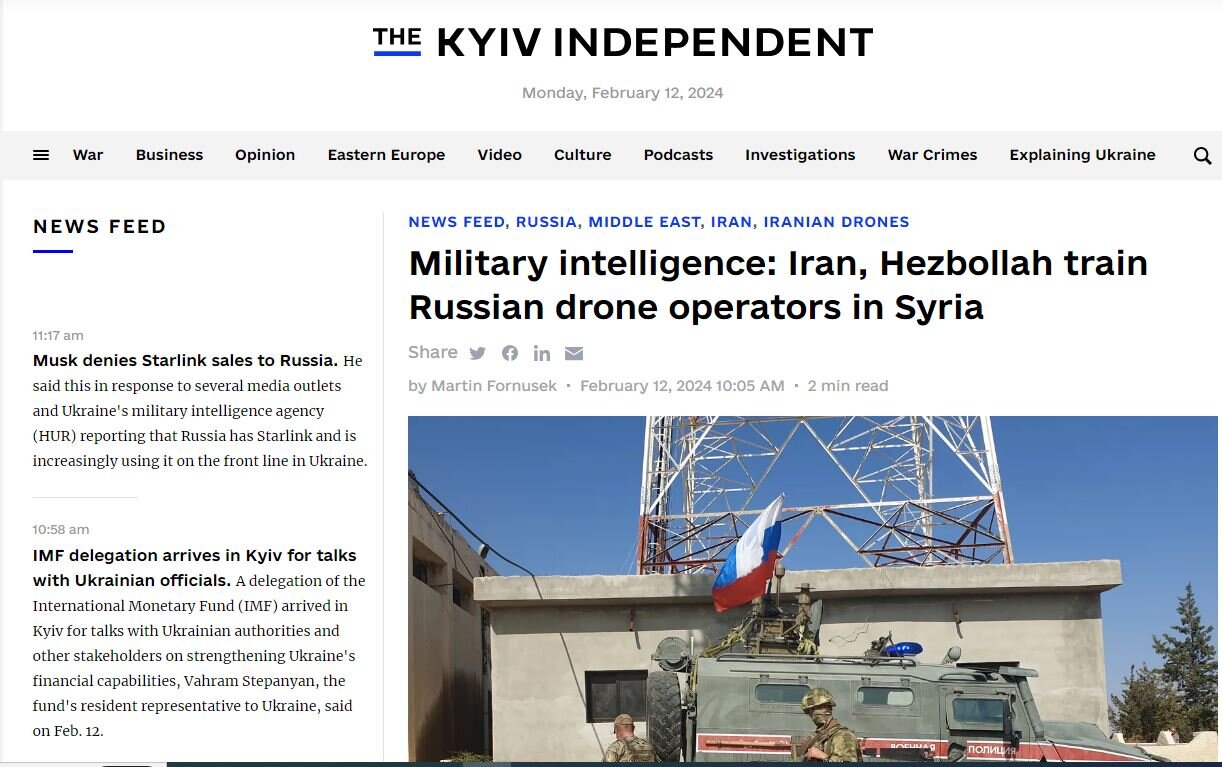A Ukrainian news outlet's allegation unpacked

TEHRAN- The Kyiv Independent newspaper has disseminated new unfounded allegations about Iran's alleged support for Russia in the Ukraine war.
In a recent development reported by The Kyiv Independent, an English-language Ukrainian online newspaper, Ukrainian military intelligence has put forward an alarming claim.
On Monday, February 12, the Ukrainian online newspaper released a report alleging a collaboration between Iran, Hezbollah, and Russian forces in the Ukrainian conflict theater.
According to the report, Iran and Hezbollah are purportedly providing training to Russian drone operators, equipping them with the expertise to utilize Iranian-manufactured Shahed and Ababil UAVs in the ongoing conflict in Ukraine. This training, as detailed in the report, is said to be taking place in Syria, where Russian forces are allegedly being schooled in the operation of drones such as the Shahed-136 "kamikaze" and the Ababil-3.
According to the report, a Hezbollah commander named Kamal Abu Sadiq leads the instruction sessions.
Furthermore, the report goes on to assert that this collaboration extends beyond mere drone operation. It suggests that Syrian fighters are also being integrated into the conflict between Russia and Ukraine through this joint effort.
As the international community closely monitors the evolving situation between Moscow and Kyiv, it becomes imperative to examine the accuracy of these claims and assess their implications for regional stability.
Unraveling the illusion: exposing attempts to tie Russia-Ukraine conflict to Iran
In a familiar narrative that seems to recur periodically, a Western-backed outlet has once again drawn false connections between the Ukraine conflict and Tehran, seeking to underscore Tehran’s involvement in the ongoing strife between Moscow and Kyiv.
This latest effort appears to be part of a broader strategy to divert public attention away from the fundamental drivers of the Russia-Ukraine conflict.
By pointing fingers at Tehran and portraying the Tehran-Moscow cooperation as a global threat, these Western entities aim to shift blame and obscure deeper geopolitical dynamics.
Conspicuously absent from this narrative are the roles of NATO’s military adventurism near the borders of Russia, Europe’s military support for Kyiv, and the United States' interventions, all of which have significantly contributed to escalating tensions between Moscow and Kyiv. Yet, these factors seem to have been conveniently sidelined in the public discourse.
Throughout the unfolding crisis, Tehran has consistently urged restraint and advocated for peaceful resolution. Iranian diplomatic channels have repeatedly called on both parties to de-escalate and prioritize dialogue over violence.
Moreover, Tehran has openly challenged assertions of its involvement, specifically regarding the alleged deployment of Iranian drones in the Ukraine conflict. Iranian officials have invited Ukrainian politicians to provide concrete evidence supporting such claims—a challenge that, thus far, remains unanswered.
Unveiling the drivers behind the Kyiv Independent report
Amidst escalating Israeli war crimes in the Gaza Strip, the White House's faltering West Asia policy, and a surge in global anti-Israeli protests, the Ukraine crisis appears to have slipped down the priority list of Washington's foreign policy agenda.
Once buoyed by the supportive rhetoric of U.S. President Joe Biden, Kyiv now finds itself grappling alone with the repercussions of Western political intervention in its affairs.
Amid the Gaza conflict, as calls for an end to the violence reverberate worldwide, the sudden resurgence of unverified reports regarding Ukraine seems calculated to rekindle global attention on the issue. However, while nations and states universally harbor concerns about the specter of war, it appears that U.S. politicians have shifted their focus away from the Ukraine crisis, leaving Kyiv to navigate its challenges without robust international backing.
The Kyiv Independent's strategic approach appears to be aimed at two distinct objectives: amplifying the Ukraine conflict's visibility on the global stage and redirecting blame towards Tehran. This dual strategy aligns closely with the broader agenda observed among Western think tanks and politicians.
By emphasizing Tehran's alleged role in Ukrainian affairs, these think tanks seek to accomplish several objectives simultaneously. Firstly, they aim to undermine Tehran's credibility and influence in international affairs. Secondly, they endeavor to shift attention away from the failures of Western policies, particularly in the context of the Israeli military's struggles against Hamas fighters and the shortcomings in addressing the Ukraine crisis.
In essence, the narrative being advanced attempts to portray Tehran as a destabilizing factor, deflecting attention from broader geopolitical realities and Western policy shortcomings.
While the Kyiv Independent's maneuvering appear as a media ploy to reignite global interest in the Ukraine issue, attributing Kyiv's failures to Tehran is a flawed narrative that has failed to gain traction in portraying Tehran as the primary instigator of the ongoing conflict.
Examining the questionable aspects and ambiguities of Kyiv Independent’s report
The recent report alleging that Iran is training Russian drone operators in Syria raises significant questions. Why would Iran choose Syria as a training ground, especially considering the intense presence of various intelligence agencies in the region?
If Iran indeed aims to train Russian forces, one would expect Russia or Iran itself to be the logical choice for such training. The decision to opt for Syria as the purported training location seems dubious at best.
The Kyiv Independent's publication of this claim only adds to the skepticism surrounding the report. Syria, embroiled in its own complex geopolitical dynamics and heavily monitored by intelligence agencies, hardly appears to be a suitable environment for such activities.
These inconsistencies underscore the need for thorough scrutiny and critical evaluation of the assertions made in the report. Without concrete evidence and a coherent rationale, such claims remain open to doubt and challenge.
Ultimately, it is evident that Kyiv's significance has dwindled in the eyes of Western politicians, who have evidently prioritized the survival of Tel Aviv over the past four months.
Leave a Comment